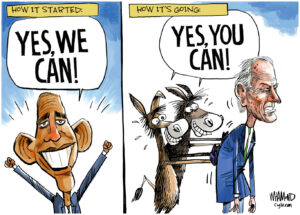President Obama and Congress Just Gave Your Savings Account to JPMorgan
With the passage of the 2015 federal budget bill, JPMorgan CEO Jamie Dimon got lawmakers to repeal a key part of the 2010 Dodd-Frank financial reform law and allow banks to use the savings accounts of ordinary Americans to gamble in the stock market on behalf of hedge funds, corporations and the rich. JPMorgan CEO Jamie Dimon. Photo by Fortune Live Media (CC BY-ND 2.0)
JPMorgan CEO Jamie Dimon. Photo by Fortune Live Media (CC BY-ND 2.0)
With the passage of the 2015 federal budget bill, JPMorgan CEO Jamie Dimon got lawmakers to repeal a key part of the 2010 Dodd-Frank financial reform law and allow banks to use the savings accounts of ordinary Americans to gamble in the stock market on behalf of hedge funds, corporations and the rich.
A former senior Treasury official in the Obama administration told The Washington Post that the law restores the ability of banks to use the same practices that helped bring down the global economy in 2008. “This was the epicenter of the crisis,” the official said. “This is what brought AIG down, what brought Lehman Brothers down.”
By a vote of 56 to 40 on Saturday, the Senate passed the $1.1 trillion bill to fund the federal government through September 2015. The chamber’s Democrats let the Wall Street provision remain apparently to postpone until March a battle with Republicans over President Obama’s immigration reform. Six Senate Democrats — Elizabeth Warren, Sherrod Brown, Al Franken, Joe Manchin, Claire McCaskill and Vermont independent Bernie Sanders — opposed the final version of the bill by voting against the motion that ended debate on it. A total of 22 Democrats were against the final form. Warren called the Wall Street provision an “unprecedented grip over economic policymaking.”
President Obama, who told Bloomberg News during a 2010 interview about the justness of the $17 million bonus Dimon received that year and that he knew Dimon and regarded him as a “savvy” businessman, backed the bill. Obama and Sen. Harry Reid said that the compromise legislation was the best Democrats were able to get before Republicans assume control of the Senate in January.
Before the bill was approved Saturday, Guardian U.S. finance and economics editor Heidi Moore explained what the Wall Street provision would do for the financial industry and against the public:
When Dimon gets his way, it’s not really about Dimon. It’s about how easy it is for Wall Street, with one good representative and a reasonable amount of political donations, to roll over any opposition, especially in Congress. Many lawmakers have always been primed to listen to Dimon. In this case, Dimon successfully lobbied members of the US House to repeal an important part of the Dodd-Frank financial reform act, which was passed in 2010 to protect Americans from losing their homes and savings in another financial crisis. The provision was buried in the $1.1tn budget bill, where bank lobbyists and their soulmates in Congress mistakenly thought no one would find it.
In a nutshell, the budget provision would allow banks to use the savings accounts of Americans to speculate in the markets on behalf of hedge funds, companies and the rich. Specifically, the banks would use customer savings to help clients make bets on derivatives, the technical financial instruments that were at the center of the financial crisis. There’s no benefit to this rule to anyone in America who has less than, say, $5m in the bank. If there were any question, merely remember that the 85-line provision was written in its entirety by bank lobbyists at Citigroup. Some, like Senators Elizabeth Warren and Representative Maxine Waters, were so outraged that they refused to pass the budget bill, even if it meant shutting down the federal government. A movement and a hashtag was born: #CitigroupShutdown.
Moore then cited criticism of the legislation by prominent D.C. lawmakers:
The lawmakers interviewed by Roll Call made remarkable statements. Nancy Pelosi rebelled: “What I am saying is: the taxpayer should not assume the risk … You succeed, it’s in your pocket. You fail, the taxpayer pays the bill. It’s just not right.” Warren objected that “a vote for this bill is a vote for future taxpayer bailouts of Wall Street … this Congress can’t be here to say what can we do to improve the profitability of a half-dozen large institutions and shove all the risk off to the American people again.” Senator Carl Levin said: “These are the banks that caused the problem to begin with … by risky bets, now we are saying more banks can engage in risky bets and, by the way, the risk being to the taxpayers,” Levin said.
Read more of Moore’s explanation of Dimon’s clause here.
— Posted by Alexander Reed Kelly.
Your support matters…Independent journalism is under threat and overshadowed by heavily funded mainstream media.
You can help level the playing field. Become a member.
Your tax-deductible contribution keeps us digging beneath the headlines to give you thought-provoking, investigative reporting and analysis that unearths what's really happening- without compromise.
Give today to support our courageous, independent journalists.








You need to be a supporter to comment.
There are currently no responses to this article.
Be the first to respond.